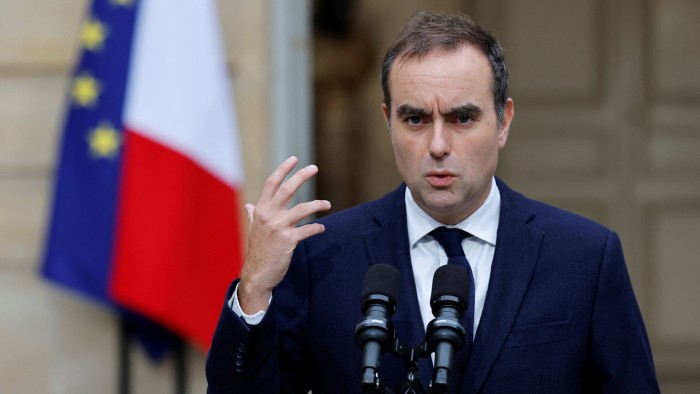Unlock the Editor’s Digest for free
Roula Khalaf, Editor of the FT, selects her favourite stories in this weekly newsletter.
Sébastien Lecornu has suggested suspending Emmanuel Macron’s emblematic pension reforms in talks with France’s leftwing opposition, as the outgoing prime minister seeks a way through France’s political crisis.
Pausing Macron’s reforms to raise the retirement age to 64 would be a major concession to the left that could avoid new parliamentary elections but only by sacrificing a central pillar of Macron’s economic reforms.
It also risks further alienating the rightwing Républicains, who want to see France’s rising debt levels taken in hand. French bonds and stocks have already sold off this week in reaction to the political uncertainty.
Outgoing finance minister Roland Lescure told France Inter on Wednesday that the suspension of pension reforms was one of the measures being assessed to pass a budget but that the move would need to be financed by other means.
“In today’s situation and given the urgency, there are ways of moving forward, but . . . changing the pension reform would cost hundreds of millions in 2026, and billions in 2027,” he said.
The reforms to progressively raise the retirement age in France from 62 to 64 were passed in 2023, but a suspension would stop the gradual increases. The measures were bitterly opposed by opposition parties and unions and sparked major protests.
Former prime minister Élisabeth Borne, who introduced the reforms to parliament and is now the outgoing education minister, told Le Parisien newspaper on Tuesday night the law should not be considered a “totem” in efforts to find a way out of the crisis.
Lecornu, who resigned on Monday after less than a month in post, has been tasked by Emmanuel Macron with leading final discussions to explore whether compromise to pass a 2026 budget can be sought in the country’s divided parliament. He will deliver a speech on Wednesday morning, the prime minister’s office said.
The overtures have been welcomed by the left, with Raphael Glucksmann, a leading centre-left politician and member of the European parliament, saying on Tuesday night that “there is a route to obtaining this suspension: our demand is not unattainable”.
Olivier Faure, head of the Socialist party, said that the move would be an “important gesture if it came to pass” but that he “wanted to know if this victory is real or not” before celebrating it.
“I need to check that this isn’t simply a smokescreen,” he said on FranceInfo on Wednesday.
Recommended
Scaling back Macron’s pension reform has been a key demand of the left and the far right but it is still unclear whether a budget including the measure would win sufficient support in France’s fractured National Assembly.
The prospect has been rejected by the conservative Les Républicains party, with Valérie Pécresse, a senior member of the party and president of the Île-de-France region. She said the move would “let the deficits of the pensions system explode” and put the burden on the next generation.
France’s borrowing rates have already increased in the past month since the previous Bayrou administration fell in a confidence vote on deficit reduction measures for next year’s budget.
Rating agency Fitch, which was the first to downgrade France’s sovereign debt last month, warned that “failure to implement fiscal consolidation measures” could leave the country facing further credit downgrades.


